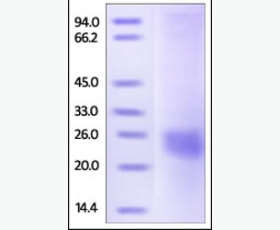Recombinant Human Indoleamine 2,3-Dioxygenase/IDO/INDO (
| Product name: | Recombinant Human Indoleamine 2,3-Dioxygenase/IDO/INDO ( |
| Source: | E.coli |
| Purity: | Greater than 95% as determined by reducing SDS-PAGE. |
| Buffer Formulation: | Supplied as a 0.2 μm filtered solution of 20mM Sodium Acetate, 150mM NaCl and 20% Glycerol, pH4.5.. |
| Applications: | Applications:SDS-PAGE; WB; ELISA; IP. |
| Storage: | Avoid repeated freeze/thaw cycles. Store at 2-8 oC for one month. Aliquot and store at -80 oC for 12 months. |
| UOM: | 100ug/50ug/200ug/1mg/1g |
SourceE.coliDescriptionRecombinant Human Indoleamine 2,3-dioxygenase is produced by our E.coli expression system and the target gene encoding Met1-Gly403 is expressed with a 6His tag at the N-terminus.NamesIndole 2,3-dioxygenase, Indoleamine 2,3-dioxygenase 1, IDO-1, IDO1, IDO, INDOAccession #P14902FormulationSupplied as a 0.2 μm filtered solution of 20mM Sodium Acetate, 150mM NaCl and 20% Glycerol, pH4.5..ShippingThe product is shipped on dry ice/ice packs.
StorageStore at < -20°C, stable for 6 months after receipt.
Please minimize freeze-thaw cycles.PurityGreater than 95% as determined by reducing SDS-PAGE.
EndotoxinLess than 0.1 ng/?g (1 IEU/?g) as determined by LAL test.Amino Acid Sequence
StorageStore at < -20°C, stable for 6 months after receipt.
Please minimize freeze-thaw cycles.PurityGreater than 95% as determined by reducing SDS-PAGE.
EndotoxinLess than 0.1 ng/?g (1 IEU/?g) as determined by LAL test.Amino Acid Sequence
MNHKVHHHHHHMAHAMENSWTISKEYHIDEEVGFALPNPQENLPDFYNDWMFIAKHLPDLIESGQ LRERVEKLNMLSIDHLTDHKSQRLARLVLGCITMAYVWGKGHGDVRKVLPRNIAVPYCQLSKKLE LPPILVYADCVLANWKKKDPNKPLTYENMDVLFSFRDGDCSKGFFLVSLLVEIAAASAIKVIPTV FKAMQMQERDTLLKALLEIASCLEKALQVFHQIHDHVNPKAFFSVLRIYLSGWKGNPQLSDGLVY EGFWEDPKEFAGGSAGQSSVFQCFDVLLGIQQTAGGGHAAQFLQDMRRYMPPAHRNFLCSLESNP SVREFVLSKGDAGLREAYDACVKALVSLRSYHLQIVTKYILIPASQQPKENKTSEDPSKLEAKGT GGTDLMNFLKTVRSTTEKSLLKEG
BackgroundIndoleamine 2,3-dioxygenase (IDO) is a heme enzyme that initiates the oxidative degradation of the least abundant, essential amino acid, l-tryptophan, along the kynurenine pathway. This protein is normally expressed in the dendritic cells, macrophages, microglia, eosinophils, fibroblasts, endothelial cells, and most tumor cells. IDO activity is associated with immunosuppression and immune attenuation. Several studies showed that IDO can contribute to immune escape when expressed directly in tumor cells or when expressed in immunosuppressive antigen presenting cells such as tolerogenic dendritic cells or tumor associated macrophages. IDO also is a promising therapeutic target for the treatment of cancer, chronic viral infections, and other diseases characterized by pathological immune suppression.













